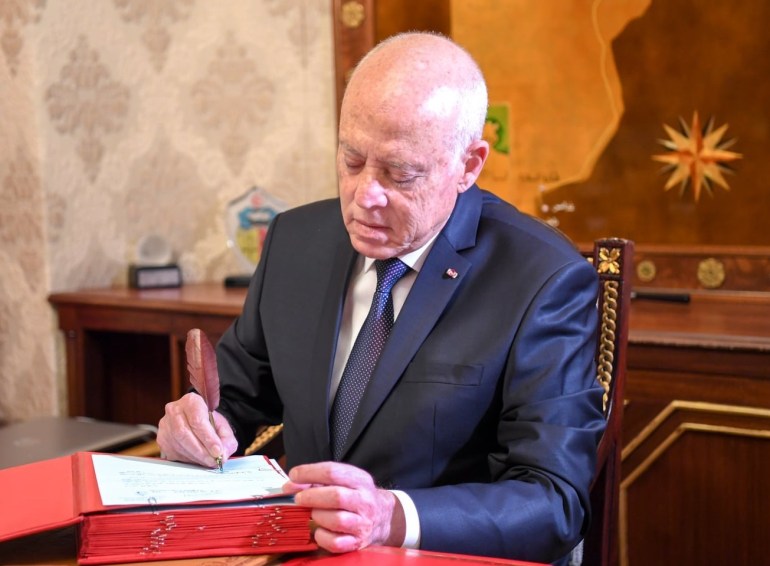The Tunisian General Labor Union (the largest union organization) welcomed the announcement of the new government, while the Secretary-General of the Workers' Party, Hamma Hammami, criticized President Kais Saied's policies, describing them as populist.
Sami Tahri, Assistant Secretary-General of the Tunisian General Labor Union, said that the union calls for a participatory dialogue and setting a time limit for exceptional measures.
The director of Al Jazeera's office in Tunisia, Lotfi Hajji, said that the member of the executive office of the union, Samir Al-Shifi, stressed that the union is waiting for an economic and social program away from the words of construction, as he put it. Al-Shifi also denied that the union has any relationship with the consultations to form the new government.
Hajji indicated that the People's Movement in support of President Saeed rejoiced at this government, and said that it was waiting for action, pointing out that this government comes as an expression of the president's program.
Naglaa Boden taking the oath (Anatolia)
criticism and approval
On the other hand, the Secretary-General of the Workers' Party, Hamma Hammami, said that President Saeed's policies, which he described as populist, would eliminate the country's sovereignty and the independence of its decision, and establish dependence on parties he described as reactionary, both internal and external.
Hammami added that what he called "the system of the Ennahda movement" was not bypassed, but was saved by new means, represented by a populist political system based on individual rule, as he put it.
Earlier in the day, President Saeed said he had approved a new government chosen by Prime Minister Najla Boden.
After that, members of the new government took the constitutional oath at the Carthage Palace in a ceremony broadcast live in the presence of the President.
The new government includes 24 independent members, including 9 women, in addition to the prime minister.
Saeed agreed to a new government chosen by Prime Minister Najla Boden (Anatolia)
rules and procedures
Under the rules announced by the president last month, when he ignored most articles of the constitution in measures his critics described as a coup, the new government will ultimately be accountable to him instead of Prime Minister Najla Boden.
Tawfiq Sharaf al-Din assumed the portfolio of the interior after he was dismissed from the same position by former Prime Minister Hisham al-Mashishi last January, and Imad Mamish, the defense portfolio, while Othman al-Jarndi was kept as foreign minister.
"One of our top priorities is to fight corruption...and restore hope to Tunisians," said Bouden, who was appointed by Saied last month.
But although Tunisia faces a looming financial crisis, it has not indicated any program of economic reforms.
word and demands
Said said, during a ceremony broadcast live, "I am sure that we will cross from despair to hope .. from frustration to work," criticizing all those who threaten the state.
Said added, "They are the ones who arrested the revolution with the laws they put in place... It was heavy years... full of blood."
He continued, "We do not want to remain under the exceptional measures, but we will remain under them as long as there is an imminent danger in the Parliament and a number of other institutions... We will not leave the country up for grabs."
Although Said's intervention on July 25 appeared to be popular after years of economic stagnation and political paralysis, opposition to it began to grow as protesters took to the streets and statements came from key local actors.
For weeks, the formation of a new government has been a demand of Tunisian politicians and foreign donors, along with a clear announcement by Said of a timetable for getting out of the crisis.
political crisis
A few days ago, Saeed commissioned Boden (63 years) to form a new government, and announced before that that he would form a committee of experts to prepare proposals to amend the political and electoral systems.
Tunisia has been suffering since 25 July, a severe political crisis, as Said issued a series of decisions, including freezing the competencies of Parliament, lifting the immunity of its deputies, abolishing the constitutionality monitoring body, issuing legislation by presidential decrees, chairing the Public Prosecution, and dismissing the Prime Minister, provided that he Executive power with government assistance.
The majority of political forces reject Said's decisions and consider them a "coup against the constitution", while other forces support them and see them as a "correction of the course of the 2011 revolution", in light of the political and economic crises and the Corona pandemic.

